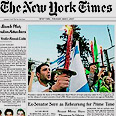
In the Jewish tradition, it’s also a time to repent for transgressions of the past year. Yom Kippur’s Al Chet prayer, for example, begs forgiveness for a long list of sins, ranging from hard-heartedness to improper speech to lying.
Because a number of influential media organizations committed the journalistic equivalent of such egregious sins, perhaps an alternate version of Al Chet would be appropriate. This prayer might involve asking the public, whom journalists are meant to serve, to grant forgiveness for the following:
For the sin of whitewashing terrorist groups
CNN’s Fareed Zakaria last month suggested that Americans should look to Hezbollah as a model of religious tolerance. That’s because the terrorist group “respects” the Jews, and is merely opposed to “Israel’s occupation of Arab lands.” So said Hezbollah’s PR chief, and so Zakaria unquestioningly relayed to his trusting viewers.
But Zakaria, who is considered an expert on international affairs, should surely know that Hezbollah’s leader insists the Holocaust is a “myth,” and was quoted in a Lebanese newspaper saying that if Jews all gather in Israel “it will save us the trouble of going after them worldwide.” How by any definition is this “respect” for the Jews?
Zakaria should also realize that, despite any euphemistic references to opposing Israeli “occupation,” Hezbollah isn’t shy about announcing, as its leader did, that “‘Israel’ is an illegal presence (and) a cancerous gland, and must be wiped out of existence.”
The Economist likewise twisted reality to whitewash a terror group. In July, the magazine reported that Hamas “implies that recognition (of Israel) would come at the end of negotiations....” Never mind that just days earlier, Hamas leader Mahmoud Zahar explained his group continues to plan for Israel’s destruction: “Our plan for this stage is to liberate any inch of Palestinian land, and to establish a state on it. Our ultimate plan is (to have) Palestine in its entirety. I say this loud and clear so that nobody will accuse me of employing political tactics. We will not recognize the Israeli enemy.”
For the sin of advocacy journalism
After Hamas terrorists opened fire on a civilian car in August, the New York Times was quick to finger the “real” culprit. It opened its story on the attack as follows: “The killing of four Israeli settlers, including a pregnant woman, in the West Bank on Tuesday evening rattled Israeli and Palestinian leaders on the eve of peace talks in Washington and underscored the disruptive role that the issue of Jewish settlements could play in the already fragile negotiations.”
In other words, when Jewish civilians are murdered in an apparent attempt by Hamas to derail negotiations, the Times bizarrely tells readers they should foremost think not about the disruptiveness of terrorism, Palestinian incitement to violence, Hamas rejection of Israel’s right to exist, lack of Palestinian support for the peace talks, or the Palestinian Authority’s inability to prevent such attacks, but about settlements. (And no, the newspaper certainly has never argued the converse: that the building of Jewish settlements underscores the disruptive role of terrorism.)
Over the past year, Israel had repeatedly called for unconditional, face-to-face negotiations. The Palestinians, before finally relenting to US pressure, had again and again insisted it will not participate in direct talks until Israel meets its preconditions.
Yet in July, as Benjamin Netanyahu was continuing to appeal for direct talks, Time Magazine falsely told its readers that the Israeli prime minister needed to be “convinced” and “coaxed” to engage in such negotiations. The following month, the Washington Post deemed it acceptable to print a cartoon showing Abbas agreeing to negotiate while Netanyahu is shown rejecting Abbas’ offer. (Abbas: “Okay.. everything is on the table.” Netanyahu: “But we refuse to sit at that table.”) The cartoonist is, of course, entitled to his own opinion. But the newspaper is ultimately responsible for whether it presents readers with patently false information.
More journalistic sins
CAMERA’s web site has documented additional journalistic sins. For example, long after video evidence clearly showed Israeli soldiers being immediately attacked upon boarding a Turkish ship trying to run the blockade on Gaza, Reuters continued to report as if the attacks on soldiers were merely an unsubstantiated Israeli claim. The Washington Post and the Independent, meanwhile, reported that a young Palestinian boy was killed, and never bothered to update readers when the boy was later found, alive and unscathed.
In light of the above, news consumers concerned with attempts to demonize and delegitimize Israel might consider making a New Year’s resolution of their own. They should resolve not to take quietly the erosion of journalist ethics. Because silence in the face of anti-Israel journalism is a form of self-delegitimization, while confidently insisting on fair coverage signals that it's okay to support the maligned Jewish state. When faced with distortions, then, resolve to contact editors; calmly and firmly remind them of their obligation to be professional, accurate and accountable when covering the Middle East conflict.
Gilead Ini, senior research analyst, Committee for Accuracy in Middle East Reporting in America















